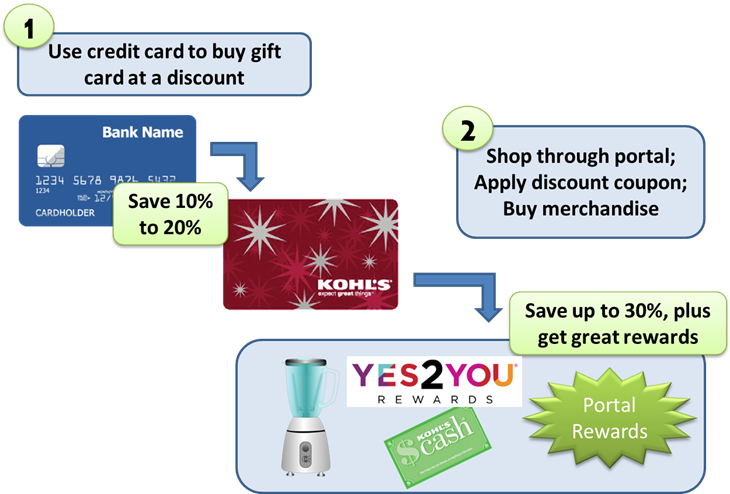NOTICE: This post references card features that have changed, expired, or are not currently available
 I write frequently about techniques for manufacturing spend. And, occasionally, I write about my own personal approach. Inevitably, though, my approach changes soon after I write about it. The latest big change, of course, was the wide shutdown of Bluebird and Serve cards on January 8th. On that day, all 6 of the Serve cards I managed were torpedoed at once. So, I’ve had to adapt again.
I write frequently about techniques for manufacturing spend. And, occasionally, I write about my own personal approach. Inevitably, though, my approach changes soon after I write about it. The latest big change, of course, was the wide shutdown of Bluebird and Serve cards on January 8th. On that day, all 6 of the Serve cards I managed were torpedoed at once. So, I’ve had to adapt again.
Here’s my current approach to manufactured spend which, maybe, will get me through winter…
Manufactured Spending Background
“Manufactured Spending” is a collection of techniques for increasing credit card spend in ways that result in getting most or all of your money back. The reasons for doing so include: meeting credit card minimum spend requirements, earning credit card big spend bonuses, or simply earning credit card rewards.
In the post, “Manufacturing Spend in 2016 and Beyond,” I gave a bit of history of manufactured spending. I showed that many of the techniques that people have used in the past for low-cost manufactured spend have dried up. While there are still a few good options out there, I doubt any are viable in the long term. Instead, the approaches to manufactured spend that will last, I believe, are those that cost more or involve more risk.
If you’re going to incur fees or risk when manufacturing spend, then you should make sure that the rewards are worth it. For example, suppose it costs you 2.5% to manufacture spend. If you earn just 1 mile per dollar with a credit card while incurring that fee, then you are effectively buying miles at 2.5 cents each. In most cases, I wouldn’t recommend that. Instead, the key is to look for opportunities to earn far greater rewards. For example, if you need to spend $3,000 in order to get a 50,000 mile signup bonus, then a 2.5% fee isn’t bad at all. I would gladly pay $75 (2.5% of $3,000) for over 50,000 miles.
My objectives
I currently have hundreds of thousands of points in each of the major transferable points programs: Chase Ultimate Rewards, Amex Membership Rewards, Citi ThankYou Rewards, and even SPG (Starwood Preferred Guest). I also have plenty of miles in a few specific airline programs: American, Delta, Alaska; and in a several hotel programs: Club Carlson, Hilton, IHG, Choice, Starwood. The majority of these balances come from years of aggressively signing up for great credit card offers.
With sizeable balances in-hand, I don’t need to aggressively pursue more and more points and miles (unless I decide to book another trip to Necker Island!). However, I’m happy to jump on opportunities opportunistically as they appear. Recently, for example, I signed up for a Chase Sapphire 65,000 point offer. And, I may try to get another Ink Plus 60K card before the 5/24 rule kicks in. Then there are the big offers that my wife hasn’t yet signed up for, including the Citi Prestige 50K offer, and the Citi AT&T card. And, of course, when Barclaycard offers me 15,000 miles for spending $500 a month for 3 months, I have to do that.
In addition to opportunistic point hoarding, I’m continuing to manufacture Delta elite status through spend. Despite blow after blow that Delta has inflicted on their (previously) loyal SkyMiles customers, I’ve somehow continued to get good value from the program. Top tier status has made it possible for my wife to upgrade to business class on her international business trips. And, my near top-tier Platinum increases the odds of my upgrades on domestic flights and means that I can make award changes for free. Pursuing Delta status does not make sense for everyone, but it works well for us. This is a strategy that I’m comfortable continuing in 2016, but I’ll re-evaluate it each year as the Delta Skymiles program continues to evolve/devolve.
So, my objectives include:
- Opportunistic point hoarding (mostly through credit card signup bonuses).
- Manufacturing spend on Delta credit cards in order to re-up high level elite status for both my wife and me.
My approach: paying more
Since my job is this blog, I think it is important for me to continually explore new options for earning points & miles and, occasionally, to revisit old options. Toward that end, I’ve been re-examining ways to buy Visa gift cards online for as low of a fee as possible. This paid off recently, for example, when I found a couple of good portal options for buying Visa gift cards from GiftCards.com. See, for example: Low fee $500 Visa gift cards online after rebate (now 1.6% back).
I’ve also tried experimenting with Visa gift card purchases at GiftCardMall.com. Sometimes GiftCardMall sends Visa gift cards that have PINs, but sometimes they send them from Incentive Card Labs without PINs (which makes them hard to liquidate). I was hoping to try to identify the key to ordering the right cards. Unfortunately, GiftCardMall cancels every order I place, so that makes the job difficult.
When I get these Visa and MasterCard gift cards, I don’t mind paying a bit to liquidate them. I used to load them to Serve for free, of course, but now I’ve lost that option. I also long ago was shut down by another no fee prepaid card option. When I tried to sign up again a few weeks ago, my account was shut down before the prepaid card arrived in the mail. So much for that. Instead of those no-fee options, I can load gift cards to any number of other cards for a small fee ($4.95 or less, typically). Many such cards (Account Now, for example) have free bill pay, so a 1% load fee isn’t the end of the world, especially if one can buy gift cards at a very low cost in the first place.
I listed additional options for liquidating gift cards here: Bluebird Serve Birdpocalypse: How to liquidate remaining gift cards. While many people gravitate towards buying money orders due to their very low fees, I don’t buy them often. I don’t like the risk involved in depositing money orders frequently to my bank (people often have their accounts shut down). Instead, I mostly use gift cards to reload prepaid cards and to pay bills that can’t usually be paid by credit card.
In addition to buying and liquidating gift cards, I’ll occasionally pay outright for credit card spend. For example, at the time of this writing, Pay1040.com charges just 1.87% for federal tax payments made by credit card. Thanks to its big spend bonus, my Delta Reserve card earns an average of 1.5 miles per dollar. So, I’m willing to pay federal taxes with that card. It’s a fairly cheap way to buy miles and earn elite status. The 1.87% fee works out to a price of about 1.25 cents per mile if you ignore the value of the earned Medallion Qualifying Miles. I regularly get much more value than that from my Delta SkyMiles, so I see federal taxes as a good way to increase spend on that card.
Similarly, in order to earn a signup bonus, or to meet the requirements of a targeted spend bonus, I don’t mind paying 2.5% to Plastiq in order to pay bills that otherwise can’t be paid by credit card.
My approach: incurring risk and long-term payouts
Another thing I do to increase credit card spend is fund loans via credit card. Kiva microloans, for example, offer an easy way to spend money and get it back. Unfortunately, you don’t earn interest on your loans, and there is a chance that borrowers will default on their loans, and your money will definitely be tied up long term. Typical loans take 8 to 12 months to fully pay back. On the other hand, there are easy ways to filter to loans with low risk and earlier payouts. Please see: Kivalens resurfaces, better than before.
In addition to Kiva loans, I’ve been playing around with Kickfurther. Kickfurther is a platform that lets companies seek short term funding from the Kickfurther community by offering a return on investment (such as 8% profit in 10 months, for example). With Kickfurther, you will earn a profit with each offer that you fund as long as the borrower pays out as promised. You can fund offers with a credit card, but you’ll be penalized 1.5% when you withdraw funds to your bank account. One huge problem with Kickfurther is that the best offers tend to be fulfilled within seconds of being active. You can read more about Kickfurther in this Kickfurther investment guide. If you’re interested in trying it, you’ll earn $5 if you signup with this link.
With both Kiva and Kickfurther, I see my contributions as long term investments in the sense that I have to be prepared not to have access to those funds for a long time. So, I set an overall budget for each one: how much money can I / do I want to float? To get started, I “invest” a bit over time until I reach my budgeted total. Then, as I receive payouts, I can reinvest those payouts in order to continue to manufacture spend. Eventually, it’s theoretically possible to reach a steady state where the amount invested equals the target budget and the amount reinvested is always exactly the amount withdrawn from each payout. In reality, though, I haven’t been disciplined enough with Kiva to reach this steady state. And, with Kickfurther, my experience is too new.
My approach: Reselling
In my recent post “Manufacturing Spend in 2016 and Beyond,” I suggested that reselling may be the single best long term strategy for manufacturing spend. The ability to buy stuff with credit cards and then resell to get most (or more) of your money back should always be possible. It’s a bit of work, but it can be quite profitable if done right.
So… I keep thinking that I’ll get back into reselling, but it just hasn’t happened. I’m not sure why not.
Still, I know there’s a lot of interest in the topic, so with thanks to my friend Trevor, author of Tagging Miles, we have a new resource page authored by Trevor on this blog: Manufacturing spend through reselling. Please check it out:






How do you make mortgage and car payments that traditionally only allow you you to pay by check or money order? Thanks!
I use the Plastiq bill payment service: https://frequentmiler.com/complete-guide-to-plastiq-credit-card-payments/
you say multiple times you dont mind paying 2.5% to meet minimum spend, if that’s the case, paying a paypal fee of 3% to a friend/family member and then having them write you a check/quickpay is the easiest solution and worth the extra .5% and 30cents.
Good point. That’s true if:
1) You haven’t already been shutdown by Paypal.
2) You don’t mind risking the possibility of being shutdown by Paypal.
3) You don’t have easy cheaper alternatives
Here is the real problem for me. I think I have gotten somewhere around a dozen or more cards this past year. Even though a long time customer of Chase, I can no longer get a Chase card, at least for a couple of years. That cuts me out of some nice cards to get. No more bluebird, harder to get those metabank cards, Walmart getting tight, Amex going with one time benefits. For a guy like me with full time job, but no company travel, it is just making this really, really hard.
[…] My winter 2016 approach to manufactured spending – Given all of the recent changes, here is a new manufactured spending approach for the new year. […]
Any idea if you can use VGC or AGC to fund kickfurther?
No, I don’t know. Haven’t tried it
Nice article
[…] this week, I published “My winter 2016 approach to manufactured spending.” In that post I mentioned that all 6 of the Serve cards I had been managing were shut down. […]
As a suggestion… While this is an important and always changing subject for many new or old blog followers or people like me that did mileage runs in 92, this is a new article and discussion is important during these tough times. As to the suggestion… It may be appropriate for some here to have elite posting status so they can be viewed as experienced in matters of reading blogs when they post “sub”. Just my 2 miles.
Hmm my gobank was shutted down two years ago, just recently applied and got approved..have yet receive my card, but reading your own experience, I suppose only matter of time I get shut down again before receiving the new card…just curious why would they approve again just to shut down for a redundant process…
I think they simply have separate systems for signing up and for shutting down. When shut down I was able to send a check to myself for the $20 I had loaded to the account. The check and my new (useless) card arrived the same day.
Hello FM,
Great article, do we have any alternative to bluebird. I would like to pay rent and car monthly payment via credit card. Please help if possible.
Thanks,
sarthak
Easiest option is to use RadPad for rent (1.99% fee with mastercard), and pay car with Plastiq: 2.5% fee for any credit card.
FM, how much is the fee to load fund at WM to Acount Now prepaid acct? Thx
I can’t remember: it’s been a while. Either $3.95 or $4.95, I believe.
maybe better to send the steps privately. if you won’t mind to share, FM, plz email me the info. TIA
Yes, I would like to know also.
me too
I really don’t think these steps are, or should be, much of a secret. I’m happy to share.
I have an Account Now card, and was unaware that it can be used to load with GC’s (which you mention in your article above). How do you do that? I checked the load options on line for Account Now and I don’t see how the GC load can be done. Thanks.
It’s just like Bluebird or Serve, but with a fee for loading. So:
1) Go to a store that allows loading Account Now (I believe they have a store finder online)
2) Try to load $495.05 (with a $4.95 fee, the total will come to $500)
3) See if you can pay with debit. Don’t mention paying with gift cards, that will just confuse a cashier.
4) Pay with debit gift card
even paying the extra fee for loading, wonder if anyone get shut down for doing regular loading then bill pay?
Based on my experience about a year ago with several Acct Now accts, you’ll get shut down once you reach around $9K in bill pay. The only activity on my accts was reload and bill pay. It might be different if you use the card for purchases too, but I never tried that.
Yes, probably. But, there are many cards that charge fees, so if you’re OK with the fees you can just move on to the next one.
Interesting that you seem to hate on the risk inherent in plastic to paper recycling. MO as an MO is YMMV, but if you practice paper route and financial diversity there is no single point of failure that can knock you out of the sky like a dead bird.
I think that “hate” is too strong of a word. I do buy MOs, just not very often. I consider that path one of many that I use.
Do you typically try to get Platinum status for yourself and Diamond for the other half?
Thank you!
Yes, usually.